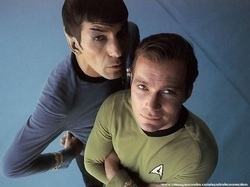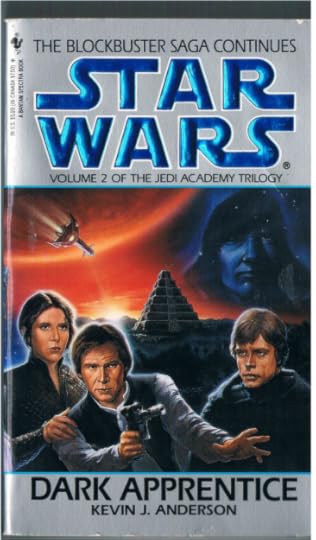Raymond K Rugg's Blog, page 5
May 4, 2014
May 04th, 2014
 In honor of May 4 (see? this proves that Star Wars is a religion, we even have our own holiday now!), this week's Sales and Sci-Fi lesson comes from a galaxy far, far away.
In honor of May 4 (see? this proves that Star Wars is a religion, we even have our own holiday now!), this week's Sales and Sci-Fi lesson comes from a galaxy far, far away.This isn't the only Star Wars lesson in The Handbook, but it was the first Star Wars lesson in the book, and it was even one of the first lessons that I formally articulated for publication.
And with Star Wars Day coming right on the heels of Free Comic Book Day-- Wow! Talk about packing in the weekend chock full o' SF fun! Anyway, here's Lesson #9 from Rugg's Handbook of Sales and Science Fiction: Star Wars, the original movie trilogy. (In the Sci-Fi Skinny section of this lesson, it also mentions the movie Wreck-It Ralph... just watched that again the other night and was amazed anew at what a GOOD movie it is! Tightly-written, killer graphics and outstanding voice-acting.)
Lesson 9-- The Sci-Fi: Star Wars, Episodes IV (A New Hope), V (The Empire Strikes Back), and VI (Return of the Jedi). Movies created by George Lucas.
The Sci-Fi Sitch: Long, long ago in a galaxy far, far away, the interstellar government of the Republic has been overthrown by the political machinations of the new Empire. On a backwater planet, a young man named Luke Skywalker dreams of leaving the farm for a life of glory. Upon learning that his true father was a warrior for the old Republic- a Jedi knight- Luke is determined to follow in his footsteps and train as a Jedi. He convinces another former Jedi, a friend of his father’s named Obi-Wan “Ben” Kenobi, to introduce him to the ways of the discipline, and after Obi-Wan’s death, he travels to a swamp planet to find the Jedi master Yoda in order to complete his Jedi training.
The Sales Sitch: Luke was a rash and brash young man, but when he realized what he wanted, he found mentors and began to learn. It took a long time— three movies in the original Star Wars trilogy—but he kept learning, and kept growing his knowledge and power. When his first mentor couldn’t provide any more guidance (Ben Kenobi was, of course killed- I mean, “went to join the Force,” mid-way through the first movie), Luke sought out a new teacher in order to continue his studies.
In sales, having a mentor is like having a guide in the wilderness. The mentor can’t do your work for you, but can help you determine more effective ways to do your work. When you make mistakes, the mentor can help you to learn from those mistakes, and to help put the situation in perspective. The mentor can suggest new or different directions for you to explore in specific sales campaigns or in your sales career in general.
The Sales and Sci-Fi Lesson: A mentor can be a powerful resource: Study under someone who is already successful and take advantage of their experience and knowledge to help guide you to your goals.
The Sci-Fi Skinny: As author/philosopher Mark Rowlands says about Star Wars in his book The Philosopher at the End of the Universe: “A long time ago in a galaxy far, far away … … blah, blah, blah …. What the hell, everyone knows this one anyway.” George Lucas, fresh off the success of his film American Graffiti, wrote a good vs. evil space opera that created and utilized a brave new world of motion picture special effects. Star Wars went on to be the most influential science fiction event the world has ever seen, and continues to impact audiences beyond the eventual original movie, original trilogy and prequel trilogy, by way of cartoons (that Lucas maintains to be Star Wars canon), novels, and games. With the much vaunted purchase of the Star Wars franchise by Disney, it is estimated that approximately 98.6 percent of the entire universe is now owned by one single entity. To quote Sergeant Calhoun in the movie Wreck-It Ralph, “Doomsday and Armageddon just had a baby, and it… is… ugly.” Who knows? Maybe this alliance of the two most powerful forces in the galaxy is a good thing. But the Calhoun quote, being from a Starship Trooper-derivative character in a Disney movie, just felt too ironically appropriate to pass up.
Published on May 04, 2014 10:44
April 28, 2014
A Sales Lesson from Shatner and Nimoy
 Here in Reno, we have an independent bookstore called Grassroots with new and used books, and every once in while, they have a warehouse sale... fill up a bag of books from their warehouse for $5!
Here in Reno, we have an independent bookstore called Grassroots with new and used books, and every once in while, they have a warehouse sale... fill up a bag of books from their warehouse for $5!At the most recent installment of this fun-for-the-whole-family event, I picked up a LOT of Star Trek stuff, both fiction and non-fiction. I think there are several new sales lessons to be gleaned from the material that I collected, but right now, I'm just having fun reading it all. So this week's Sales and Science Fiction lesson is going to be an already-existing lesson pulled from the Handbook.
So here goes... Sales and Sci-Fi Lesson Number 31, The careers of William Shatner and Leonard Nimoy.
The Sci-Fi: William Shatner and Leonard Nimoy. Industry anecdote.
The Sci-Fi Sitch: In 1967, the world saw a science fiction television drama hit the small screen. Star Trek lasted three seasons, and immediately spawned a Saturday morning cartoon spin-off, as well as books and comics and fan conventions. A decade later, a motion picture. Then more movies, syndicated sequel television series, and finally, well into the new millennium, a motion picture re-boot trilogy. Much of the enduring success of Star Trek has to be laid at the feet of William Shatner, who played the dashing self-confident Captain James T. Kirk, and Leonard Nimoy, who played the hyper-logical, faintly sinister and mysterious half-human, half-Vulcan science officer Mr. Spock.
But on the other side of the coin, perhaps much of the subsequent success of the long and profitable careers of both Shatner and Nimoy has to be laid at the feet of Star Trek. The franchise gave them characters that really captured peoples’ imaginations, and through the following years and decades, gave them opportunities to act, write, direct and appear at conventions. Both men have done other things with their lives, big and significant projects, but the world will always know them first and foremost as Kirk and Spock.
And while the upside is obvious (more fame and fortune than you can shake a stick at), it can’t have always been easy to be the focus of what many feel to be a Sci-Fi cult. You probably personally know some Trek fans who memorize the language of the Klingons or who have studied the blueprints of the USS Enterprise until they can watch an episode and point out a door on the set and tell you where it is supposed to lead. (Or you might even be one of these kind of fans yourself.) The fans who dress up as characters from the show, who obsess over not only the characters, but over the private lives of the people who portray those characters. The money and the acclaim that Star Trek brought to William Shatner and Leonard Nimoy was not without some stress and sacrifice, not without some aspects that would, understandably, bring along a small twinge of resentment.
These actors’ ambivalence about their Trek roles has peeked through in the past. Take situations such as Shatner’s skit on Saturday Night Live in which he portrays himself at a Trek convention, becoming exasperated with the fans and telling them to go out and get a real life. Or such as Nimoy’s book, I Am Not Spock, his 1975 autobiography in which he sought to establish a distance between himself and his role. Yet, to invoke a phrase from another SNL skit (unrelated but very appropriate), Star Trek “been berry, berry good” to Shatner and Nimoy. Above and beyond the series and the conventions and the what-not, Shatner has written a number of science fiction novels, some set in the Trek universe. Nimoy’s Spock, despite having been killed off in one of the early TOS Trek films, returned to the franchise’s storyline, and even had a part in the J.J. Abrams Star Trek re-boot movie.
To be fair, I’m not saying that these two actors go around bad-mouthing Trek, or complaining about their lives. Nimoy did pen a subsequent book called I am Spock. And in the dedication of his novel, Star Trek Spectre, Shatner wrote, “Star Trek has been good to me: Fame, Fortune, Fantasy. But most of all, Friendship.”
The Sales Sitch: What both Shatner and Nimoy have done is played to their strengths. William Shatner was a classically-trained Shakespearean stage actor. Leonard Nimoy is a gifted actor and photographer who made no secret of the fact that Spock gave him a bit of an identity crisis. But the Kirk and Spock characters are what they do so well, and they are what the audiences respond to. In Shatner’s case, he’s also taken the larger-than-life charisma of Kirk and translated it to other roles and personas, such as T.J. Hooker and the Priceline Negotiator. Kirk even showed up on a broadcast of the Academy Awards, with “advice from the future.” And so, these actors keep coming back to these roles, these types of characters that have garnered them such success. If marketing is what you do so well, and it is what prospects respond to and it is what gets you sales, then keep coming back to that role. If wowing a client with the technology of your product is what your strength is, then play to it. If your strength is in providing outstanding service to your clients, then make sure your prospects know it, use testimonials from your loyal clients to make your case.
The point is, find your strength and play it to the hilt. Don’t let a sales guru, an expert, or even your manager, tell you that you have to do something different. Of course, this only applies if you are being successful; just because you like a certain mode of operation doesn’t mean it’s your strength. It’s only a strength if it is producing good results. But once you do find that strength, run with it for all it’s worth.
The Sales and Sci-Fi Lesson: Discover your strengths that lead to success, and then play to them, for all you’re worth.
The Sci-Fi Skinny: I have had the honor of hearing both William Shatner (Canadian actor, writer, director, b. 1931) and Leonard Nimoy (American actor, director, photographer, b. 1931) speak in person. I don’t pretend to know either of them, but do hold both in the highest regard. Related bonus Sales and Sci-Fi Lesson: If you’ve been in sales any amount of time at all, you’ve probably run across the advice to find photos of things relating to your goals, such as a new house, or a great new car, or something to represent your child’s college tuition, and stick them up on your bulletin board or somesuch. One of the things that I have posted on my board in my office isn’t so much one of my goals, but is a magazine clipping intended to remind me of the lesson to play to your strengths; I don’t recall what business magazine it came from, nor what year it is from, but it is a sidebar item with a photo of Shatner, noting that the Toronto Sun reported that his shares in web-based Priceline travel site were worth $582 million. That’s $582,000,000. 582. Million. Dollars. (“Wait, what?”) And that’s a great reminder of what playing to your strengths can do for you.
Published on April 28, 2014 20:37
April 20, 2014
A Sales Lesson from Doctor Who
 The Sci-Fi: Doctor Who; Asylum of the Daleks. Season 7 (new series) or Season 33 (overall), Episode 1 of the television show Doctor Who. Directed by Nick Hurran and written by Steven Moffat.
The Sci-Fi: Doctor Who; Asylum of the Daleks. Season 7 (new series) or Season 33 (overall), Episode 1 of the television show Doctor Who. Directed by Nick Hurran and written by Steven Moffat.The Sci-Fi Sitch: In the first episode of season 7 of Doctor Who, the inimitable Time Lord (in his 11th incarnation, portrayed by Matt Smith) has been kidnapped by the Dalek Parliament. (The Daleks being, as the BBC puts it, “his oldest foe.”) They want him to travel down to a planet where they have quarantined those members of their race who are considered to be too crazy and destructive even for Dalek society. The Doctor and companions Amy and Rory Pond are beamed down to this ‘Asylum of the Daleks,’ and well, no, hilarity does not ensue, but plenty of scary and emotional scenes are experienced by all.
The Sales Sitch: Do you know how many times the Doctor has defeated the Daleks? Neither did I. But when I saw this episode, I figured it had to be up there in the dozens. (In fact, the UK’s Guardian, as of this particular episode, pegged it at 34 storylines involving the Daleks.) Didn’t he even destroy them all in the Last Great Time War? (Well, yes, but no. You know, wibbly-wobbly, timey-whimy.) But they just. Keep. Coming. Back. New season, new battle with the Daleks.
And that’s the sales lesson to be drawn from this. Your toughest competitors are always out there in the shadows, waiting to take advantage at any time. There is a sales saying to the effect that the day you sign a client is the day you start losing them. That’s the flip-side to the lesson of the Daleks. The day you beat your ‘oldest foe’ is the day that that foe begins another campaign that will be the end of you, or will take the client away from you, if you’re not careful.
The Sales and Sci-Fi Lesson: Don’t ever count your competitor out of the running, because they will always come back. The best you can do is to beat them for now- beat them this season, beat them this episode, beat them this sales cycle.
The Sci-Fi Skinny: Doctor Who is a BBC television series about a Time Lord, an alien adventurer through time and space in his TARDIS, which looks on the outside like a British police box and is, famously, bigger on the inside. Guinness World Records pegs Doctor Who as the World’s Most Successful Sci-Fi series, as well as being the Longest Running Sci-Fi series. And the related media are beyond number, from books to radio shows to comics and on to infinity. As far as the television show itself, the original ran from 1963 to 1989. There was a sputtering attempt to re-launch it in 1996, and then in 2005, Doctor Who returned to television with a vengeance, and has been going strong ever since, including a big 50th anniversary bash in 2013.
Published on April 20, 2014 21:26
Hellooooo, New Format!
 Happy Spring, everyone!
Happy Spring, everyone!Beginning now, the Sales and Science Fiction Blog is adopting a new format. On the weekend, I'll be posting an actual Sales and Science Fiction Lesson, either from the Handbook, or one that has been newly developed. During the week, on no set schedule or pattern, there will be other posts on matters of sales, or SF, or both.
On the book front, the Handbook of Sales and Science Fiction is undergoing a few tweaks, adding a few reviewer quotes, odds and ends like that, and I'll put out a big announcement when that all gets done and the book is ready for mass consumption once again. As for the sequel, Rugg's Handbook of Sales and Swords & Sorcery (and other Fantasy of all sorts) , it's chugging along nicely; we're in the final stages of selecting the 42 lessons to be included and having (mostly) civil discussions regarding just what makes for Swords & Sorcery and what doesn't. (And just what makes for Fantasy and what doesn't, as far as that goes.)
So that's that. Enjoy the new format of the blog, look forward to some other changes on the site, and as always, please don't hesitate to join the discussion by commenting on a post or sending me over an e-mail.
Best,
RKR
Published on April 20, 2014 19:53
January 21, 2014
Let's help women to destroy sci-fi! @lightspeedmag @catrambo #kickstarter
 Cat Rambo! If you're into the politics of the genre, as opposed to just enjoying the stories, then you are probably aware of the school of thought that women/girls/gals/females just can't do justice to science fiction. The people who are NOT men/boys/guys/males weren't given the right temperament/knowledge/world outlook by God/the Creator/Nature/the Universe to write real sci-fi.
Cat Rambo! If you're into the politics of the genre, as opposed to just enjoying the stories, then you are probably aware of the school of thought that women/girls/gals/females just can't do justice to science fiction. The people who are NOT men/boys/guys/males weren't given the right temperament/knowledge/world outlook by God/the Creator/Nature/the Universe to write real sci-fi.Well, I'll tell you my stance on this right up front. When it comes to an author's gender, I feel like Stephen Colbert talking about race. ("I don't see color. People tell me you're black, but I wouldn't know, because I don't see color." )
However, Lightspeed Magazine does see gender. And they're not only recognizing the detrimental effect of women on science fiction, they're celebrating it.
LIGHTSPEED MAGAZINE's June 2014 issue—our fourth anniversary issue—will be a Women Destroy Science Fiction! special issue. And we will also—for the first time in LIGHTSPEED's history—have a guest editor at the helm. The original announcement of this special issue generated so much excitement that we wanted to find ways to include even more amazing science fiction by women. So—with your help—we're going to make the special issue twice the size of a normal issue of LIGHTSPEED.Lightspeed has put this project on Kickstarter, and has already tripled the goal of $5,000. Right now, they have raised just over $15,000. If they get to $25,000, they will add another edition- Women Destroy Horror! And at $35,000, they will add Women Destroy Fantasy!
And we are pleased to announce that Women Destroy Fantasy! will showcase the return of the whimsical editorial stylings of none other than long-time Fantasy Magazine editor, CAT RAMBO!And I say, let's get to that $35,000 level! Because, to channel Stephen Colbert once again, Cat Rambo is a friend of the show, or at least of Sales and Science Fiction. Not only is her short story, Whose Face This Is I Do Not Know the basis for Lesson 27, but Cat herself was gracious enough to discuss the origins of the story with me.
Everyone who pledges $5 or more will also receive a copy of Women Destroy Fantasy!
So click on over to theLightspeed Kickstarter, and let's get busy with the genre destroying!
Published on January 21, 2014 19:36
January 20, 2014
A new- or at least another- Big 3 for Sci-Fi @furiousfanboys #starwars
 I often talk about the Big 3 of the Golden Age of Science Fiction; Robert Heinlein, Isaac Asimov and Arthur C. Clarke.
I often talk about the Big 3 of the Golden Age of Science Fiction; Robert Heinlein, Isaac Asimov and Arthur C. Clarke.But these days, if someone in the sci-fi blogosphere mentions "the Big 3," chances are they are talking about a different set of people. Furious Fanboys reports today that Carrie Fisher, Mark Hamill and Harrison Ford are expected to get back to the old grindstone and start work on Star Wars Episode VII in March or April, and refers to these stars of the franchise as the Big 3. It's a pretty short post but you can find it at the Furious Fanboys site.
Furious Fanboys is a particular favorite site of mine, not the least because I contributed some posts back in the summer of 2011, mostly about the 69th annual World Science Fiction Convention that took place in Reno, Nevada, in August. If you go to the site and search "Reno," I think you can find most of my posts, except the one on Cowboys and Aliens... search "cowboy" for that one.
Published on January 20, 2014 20:05
January 19, 2014
Mars. Please? #mars @roddymcdowall @npr @MSTK3info #twilightzone
 National Public Radio on the internet has an article today about getting people onto Mars. I clicked on it because this weekend, we watched Laserblast on Mystery Science Theater 3000, in which appeared the inimitable Roddy McDowall. After the closing credits of Laserblast (in which they misspelled McDowall's name), we flipped on over to an episode of The Twilight Zone, in which McDowall played the sole survivor in the crash-landing of Earth's first humanned mission to Mars (Twilight Zone, season 1, episode 25, "People Are Alike All Over." This episode is based on the short story "Brothers Beyond the Void" by Paul Fairman in Fantastic Adventures March, 1952, and was also included in August Derleth's anthology Worlds of Tomorrow.)
National Public Radio on the internet has an article today about getting people onto Mars. I clicked on it because this weekend, we watched Laserblast on Mystery Science Theater 3000, in which appeared the inimitable Roddy McDowall. After the closing credits of Laserblast (in which they misspelled McDowall's name), we flipped on over to an episode of The Twilight Zone, in which McDowall played the sole survivor in the crash-landing of Earth's first humanned mission to Mars (Twilight Zone, season 1, episode 25, "People Are Alike All Over." This episode is based on the short story "Brothers Beyond the Void" by Paul Fairman in Fantastic Adventures March, 1952, and was also included in August Derleth's anthology Worlds of Tomorrow.)And let me tell you what... after perusing the web article about the science fact of humans visiting Mars, I think I'll be sticking to the science fiction of humans visiting Mars.
For one thing, why aren't our governments getting off of their fat-cat rear ends and getting us out into the solar system? The article quotes President Obama as saying that we'll work toward a mission that gets people into orbit around Mars and then get them back home, and that a Mars landing would follow sometime after that. Well I say, heck with that, if we're going to get people that close to the red planet, then make it a landing mission. How much of a bummer would it be to be the astronaut that got into orbit around Mars, but didn't land?
For a second thing, enough with the robots. Yes, we can send robots into space and out to the other planets. And we have. Remember the Viking lander in 19-freaking-76? We put a robot on Mars 38 years ago. Time for humans to follow.
And finally, who are these people commenting on the NPR website in general, and this article in particular? Most of them have a hard time stringing two words together , and when they do, they are all like, "We shouldn't go to Mars!" and "Why would we want to go to Mars?" and "There's no movie theater on Mars so no one in their right mind would want to live there?" (I'm not even making this one up.) I guess I've bought into the stereotype that NPR listeners and PBS viewers trend toward the more intellectually curious of our society. But if these comments are representative of the intellectually curious in our country, then I weep for the future.
NPR article at Mars or Bust: Putting Humans on the Red Planet.
Published on January 19, 2014 18:30
January 18, 2014
Your product is only worth what YOU say it is... @theSalesHunter #discount
 Sales consultant Mark Hunter I just subscribed to a new sales tips newsletter/e-mail. It's from the Sales Hunter, Mark Hunter (cool use of the surname for his biz identity, btw!). Hunter is a sales consultant and speaker, and I happened upon one of his video blog posts on while poking around on Twitter.
Sales consultant Mark Hunter I just subscribed to a new sales tips newsletter/e-mail. It's from the Sales Hunter, Mark Hunter (cool use of the surname for his biz identity, btw!). Hunter is a sales consultant and speaker, and I happened upon one of his video blog posts on while poking around on Twitter.The video tip is just under two minutes long, is on You Tube, and is titled, "Number One Reason Salespeople Discount Price."
Listen to what he has to say, because it sounds legit. And I'll also toss in my own two-cents worth, from The Handbook of Sales and Science Fiction. This quote comes from the Sales Philosophy section of my Introduction to The Handbook, a philosophy that can be summed up by this statement: "Do what's best for the clients, and get paid fairly for doing so."
...I've come to realize that whatever value you place on your product or service becomes the automatic maximum value that anyone will place on it. If you discount your price, then even your good friends and clients will feel that your service is worth only that amount. In the end, you do no one ... any favors by accepting less than what you are really worth, just in order to make a sale.Mark Hunter has also written the book High-Profit Selling: Win the Sale Without Compromising on Price. The promo notes that "Too many salespeople believe that a sale at any price is better than no sale at all. This powerful guide helps move readers toward a profit-centered approach that will strength en their relationships and increase their bottom line." The links below take you to the hard-copy and Kindle versions of Hunter's book, as well as the hard-copy and Kindle versions of my Handbook of Sales and Science Fiction.
Published on January 18, 2014 11:44
January 17, 2014
Another take on 'Geek Culture in the Mainstream' @doctorow @amazonkindle
 Cory Doctorow I often post about how Spec Fic, i.e., sci fi and fantasy and comics and nerds and geeks stuff, is becoming more mainstream, and is claiming a larger portion of the general public's money pie all the time.
Cory Doctorow I often post about how Spec Fic, i.e., sci fi and fantasy and comics and nerds and geeks stuff, is becoming more mainstream, and is claiming a larger portion of the general public's money pie all the time.Here's a post about the subject that offers up some proofs of the takeover, at least the culture side of it, if not the economic side of it. Lots of good links, plus a very interesting and thought-provoking comment on the post ("Having access to geek knowledge does not make one a geek.")
Also mentioned in the post is The Rapture of the Nerds by Cory Doctorow and Charles Stross, and of course, Doctorow's novel Little Brother was the subject of The Handbook's Lesson #33.
The post can be found at the Kindle Daily Post blog.
Published on January 17, 2014 18:07
January 13, 2014
Star Wars: Canon is as Canon does
 Umm... Han Solo and the Kingdom of the Crystal Skull? In sales, it's possible to get scattered, to lose your focus, to just have so much going on in so many directions that it turns out that nothing is going on. Then it's time to stop, take a deep breath and center yourself.
Umm... Han Solo and the Kingdom of the Crystal Skull? In sales, it's possible to get scattered, to lose your focus, to just have so much going on in so many directions that it turns out that nothing is going on. Then it's time to stop, take a deep breath and center yourself.Turns out, the same situation is possible in Star Wars.
Way back before Star Wars became the galaxy-devouring behemoth that it is today, other storylines were built off of the original movie, what is now known as Episode IV: A New Hope. One of the first was an Alan Dean Foster novel called Splinter of the Mind's Eye. Marvel comics had a Star Wars line, and I can remember Luke riding on the backs of sea dragons on an ocean world in a couple of issues. Han and Chewie were off someplace by themselves having smuggling adventures and battling the soldiers of the Corporate Sector.
And that was all before the whole thing got really popular. In the past 30-odd years, there's been just tons and tons and tons of Star Wars narrative. Lucas tries to rewrite history and say that the whole chronology was already in place when he wrote the first movie, but those of us who were there know that it just ain't so. Star Wars reality was being made up as it went along, at least in the beginning. So here's the Q & A...
Q: Of all of this endless Star Wars material, what should be considered to be CANON ?
A: ScienceFiction.com has the A right here, with Lucasfilm Finally Defining 'Star Wars' Canon.
BTW, Rugg's Handbook of Sales and Science Fiction references Star Wars in Lessons 9, 12 and 34.
Published on January 13, 2014 19:48



